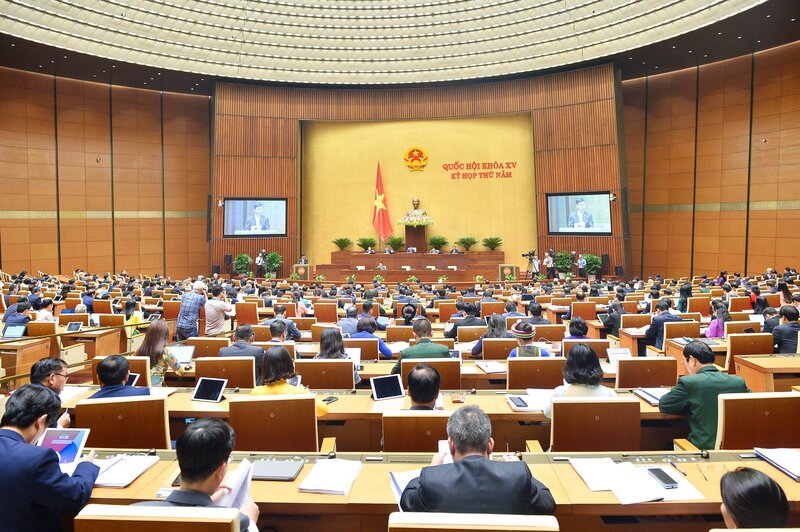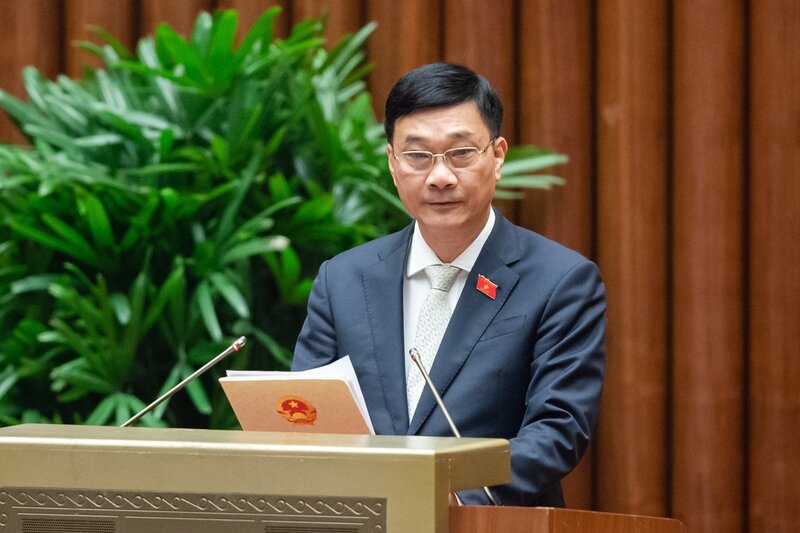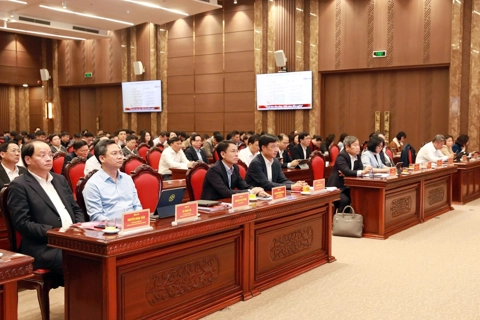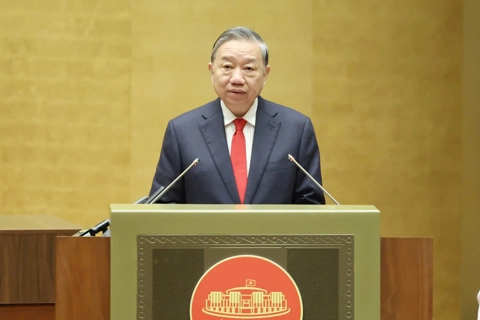Vietnamese Gov’t under pressure to realize 6.5% GDP growth target
Vietnam's economic growth began to weaken in late 2022 and continued into early 2023, resulting in GDP growth of only 3.32% in the first quarter.
It would be challenging for Vietnam's economy to achieve 6.5% GDP growth target this year, said Chairman of the National Assembly's Economic Committee Vu Hong Thanh at today's opening session [May 22].
| Overview of the session. Photos: quochoi.vn |
Thanh highlighted that Vietnam's economy had experienced a slowdown from late 2022 to early 2023, resulting in GDP growth of only 3.32% in the first quarter.
"To achieve the targeted 6.5% growth for the year, the average growth rate for the remaining quarters needs to be around 7.5%," he added.
Meanwhile, challenges in the financial and corporate bonds markets have made it difficult for businesses to access capital, leading to stagnation in the real estate sector. Key drivers of growth, such as exports and foreign direct investment, have also declined, and industrial production is experiencing a downturn.
According to Thanh, one of the main reasons for the economic slowdown is the negative growth in the industry and construction sectors, which contracted by 0.4% in the first quarter.
The index of industrial production (IIP) has decreased by 1.8% in the first four months of the year, with the processing and manufacturing sector witnessing a decline of 2.1%. Electricity consumption data for the same period also fell by 0.4% year-on-year, indicating a decrease in manufacturing activities.
Given the current difficulties, Thanh has expressed skepticism about the possibility of achieving a significant breakthrough in GDP growth during the second quarter.
Over the first four months of the year, approximately 79,000 businesses registered for establishment or reinstatement, averaging about 19,700 new companies starting operations each month.
| Chairman of the Economic Committee Vu Hong Thanh. |
However, these positive figures are offset by the withdrawal of 19,200 units from the market each month. Many enterprises are under immense pressure to repay debts, leading them to sell shares at significantly reduced prices, often to foreign companies. The lack of orders is a common challenge for businesses, resulting in job losses in various industrial parks, Thanh said.
Data from the General Confederation of Labor of Vietnam showed that from September 2022 to January 2023, nearly 547,000 workers at 1,300 enterprises had their working hours reduced or were temporarily suspended due to a drop in orders. Foreign direct investment (FDI) enterprises accounted for 75% of these affected workers.
Companies are currently facing cash flow challenges, exacerbated by difficulties in accessing credit due to high-interest rates. According to the Government, the average interest rate for new loans is 9.3%. However, data from the National Financial Supervisory Commission shows that the average lending rate among 35 commercial banks at the end of March was about 10.23%, an increase of 0.56 percentage points from the end of 2022.
Furthermore, the sluggish handling of weak credit institutions has been highlighted as a concern by the Economic Committee. This slow process hurts the money market and hampers banks' efforts to lower interest rates. Non-performing loans (NPLs) are increasing, while the ratio of loan loss provisions to NPLs is decreasing, thus affecting the overall stability of the financial system.
The issue of cross-ownership undervalued collateral assets and loans to internal businesses remain complex. Despite businesses facing numerous challenges, commercial banks continue to generate high profits, said Thanh.
Better responsiveness required from the Government
| Deputies at the session. |
Deputy Prime Minister Le Minh Khai said in his previous report that although GDP in the first quarter was lower than expected at 3.32% year-on-year, the consumer price index (CPI) rose 3.84% in the four months.
By April 25, credit growth had increased by 2.75%, and the money market and exchange rate were generally stable. The average lending rate had declined by 0.7 percentage points compared to the end of 2022.
Budget revenue for the first four months was estimated at VND632.5 trillion (US$27 billion), or 39% of the annual target.
Vietnam achieved a trade surplus of nearly US$7.6 billion, more than triple the figure for the same period in 2022. Disbursement of public investment capital increased by VND15 trillion ($640 million) over the same period.
However, the growth rate is slowing down, as evidenced by GDP in the first quarter being 1.7 percentage points lower than the same period last year (5.03%). Production and business activities face numerous challenges, especially in the industrial, construction, and small and medium enterprise sectors. Major traditional export markets are shrinking, resulting in a lack of orders for businesses.
Newly registered FDI capital decreased by almost 18%, while realized capital decreased by 1.2%. The total number of newly established and reactivated enterprises declined. The corporate bond and real estate markets faced liquidity and cash flow difficulties due to long-standing problems.
Khai noted an imbalance between labor supply and demand at the local level had led to cases of job loss in certain areas and industrial zones. The youth unemployment rate remains high at over 7.6%. In addition, there has been a significant increase in the number of workers opting to withdraw lump-sum social security contributions, which has exceeded 19%.
Apart from objective factors, the deputy prime minister acknowledged that the aforementioned decline could be attributed to subjective factors stemming from long-standing internal weaknesses within the economy, which have gradually become more apparent under challenging conditions.
The analysis and forecasting of the situation and the development of response scenarios are still limited. Some officials and civil servants have not shown the necessary level of determination, timeliness, and responsiveness. In addition, a mentality of avoidance, fear of responsibility, reluctance to act, and fear of making mistakes is prevalent," Khai concluded, Khai concluded.














